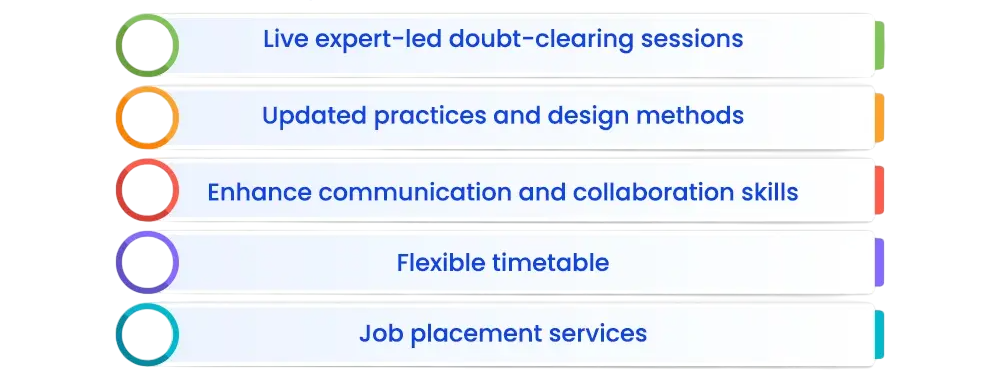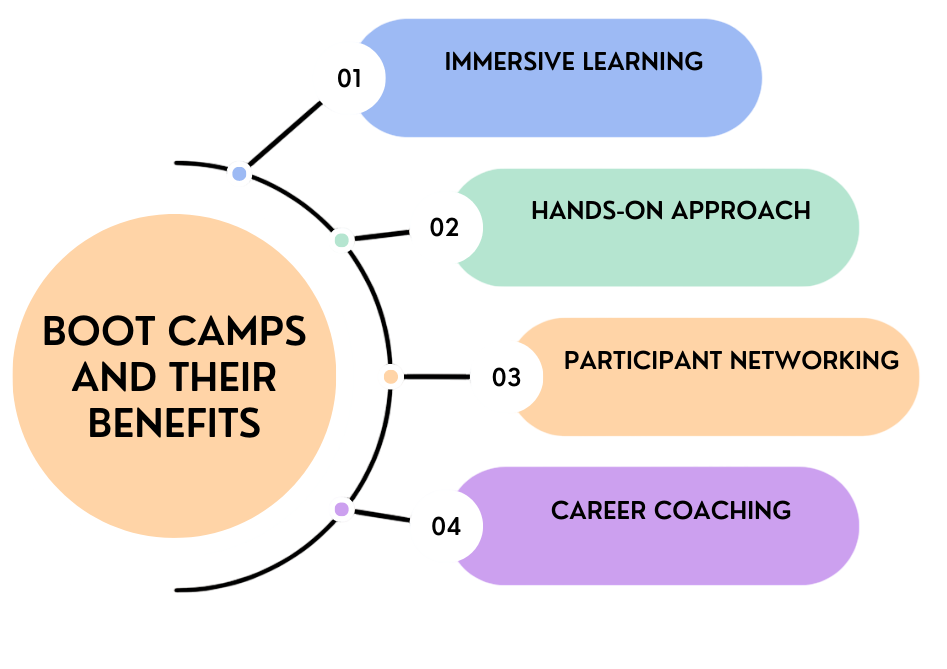
- What is a Bootcamp?
- Definition of Bootcamp
- Types (Coding, Data Science, etc.)
- Format and Duration
- Curriculum and Learning Style
- Popular Bootcamp Providers
- Benefits of Bootcamps
- Cost Comparison with Degrees
- Job Placement Support
- Online vs Offline Bootcamps
- Are Bootcamps Worth It?
- Conclusion
What is a Bootcamp?
In recent years, bootcamps have become an increasingly popular educational option for individuals looking to develop new skills in a relatively short period. Bootcamps are immersive, intensive training programs designed to help participants gain expertise in specific fields, such as coding, data science, and digital marketing. These programs aim to equip students with practical, job-ready skills, often making them an attractive alternative to traditional higher education or self-paced learning methods. Bootcamps have gained recognition due to their ability to fast-track careers in fields that are in high demand, offering a streamlined approach to gaining specialized knowledge. To accelerate your career with data-driven decision-making and strategic insight, explore Business Analyst Training a program designed to equip professionals with analytical frameworks, business intelligence tools, and real-world applications that align with today’s fast-paced, high-impact roles. With their practical, hands-on curriculum and accelerated format, bootcamps are often seen as an efficient way to transition into a new career or enhance existing skills. However, with their rising popularity, it’s important to understand the full scope of bootcamps, including their benefits, limitations, and how they compare to traditional degree programs.
Definition of Bootcamp
A bootcamp is an intensive, short-term training program designed to provide individuals with the skills necessary to succeed in a specific career or field. Typically focusing on practical knowledge, these programs aim to train students for particular roles, such as software developers, data analysts, or digital marketers, within a matter of weeks or months. To explore a strategic alternative that blends analytical thinking with business insight, visit Business Analyst Career Path a guide that outlines the progression from foundational skills to advanced roles in business strategy, stakeholder engagement, and data-driven decision-making. Bootcamps differ from traditional academic degrees by their speed, cost, and focus on real-world application. Unlike traditional classroom education that spans several years, bootcamps condense curriculum into an accelerated format that focuses solely on job-ready skills. They often feature a hands-on approach, where students work on live projects, group activities, and practical exercises that mirror the challenges faced in the real world. Many bootcamps emphasize learning through practice, collaboration, and problem-solving, rather than focusing solely on theoretical knowledge.
Interested in Obtaining Your Business Analyst Certificate? View The Business Analyst Training Offered By ACTE Right Now!
Types (Coding, Data Science, etc.)
Bootcamps cover a wide array of disciplines, but the most common types include coding, data science, digital marketing, and business analytics. To understand how data infrastructure supports these fast-track programs and drives enterprise-level insights, explore Business Intelligence Architecture a framework that outlines how data pipelines, reporting systems, and analytical platforms are structured to deliver scalable, actionable intelligence across industries.
- Coding Bootcamps: These programs focus on training students to become proficient in software development, web development, or mobile app development. Participants learn coding languages such as Python, JavaScript, Ruby, and others. They are taught various development frameworks, tools, and practices that allow them to build applications and websites. Popular bootcamps in this category include General Assembly, Le Wagon, and App Academy.
- Data Science Bootcamps: Aimed at individuals seeking careers in data analysis, machine learning, and artificial intelligence, these bootcamps teach participants how to work with large datasets, use statistical tools, and develop predictive models. Students learn programming languages like Python and R, along with tools such as SQL and Tableau. Notable data science bootcamps include DataCamp, Springboard, and Flatiron School.
- UX/UI Design Bootcamps: These bootcamps focus on user experience and user interface design, teaching students how to design intuitive, user-friendly websites, apps, and other digital products. Topics often include design thinking, wireframing, prototyping, and usability testing. Providers like Designlab, CareerFoundry, and Ironhack specialize in UX/UI design bootcamps.
- Digital Marketing Bootcamps: These programs teach individuals how to succeed in the marketing world by focusing on social media marketing, SEO, PPC advertising, email marketing, and analytics. Many bootcamps offer practical experience in creating marketing campaigns and understanding digital marketing metrics. Providers in this space include Digital Marketing Institute, Simplilearn, and Springboard.
- Cybersecurity Bootcamps: Designed for individuals who want to break into cybersecurity, these bootcamps teach students how to secure networks, prevent data breaches, and respond to cyber threats. Students learn about encryption, firewalls, penetration testing, and security protocols. Providers such as Flatiron School, The Cybersecurity Bootcamp at UC Berkeley, and Springboard are among the leaders in this field.
- Product Management Bootcamps: These bootcamps focus on training individuals for product management roles. Students learn how to manage product lifecycles, communicate with stakeholders, and make data-driven decisions. Product Management bootcamps include programs like Product School and Pragmatic Institute.
- Full-time Bootcamps: These are immersive, intensive programs where participants commit to attending classes and completing coursework on a full-time basis. They typically last between 8 to 16 weeks and require participants to dedicate significant time to learning each day. This format is ideal for individuals who can afford to take time off from work or other responsibilities.
- Part-time Bootcamps: For those who cannot commit to a full-time schedule, part-time bootcamps offer a more flexible learning option. These programs usually last longer (3 to 6 months) but allow students to continue working or pursuing other commitments while learning. The schedule typically includes evening or weekend classes.
- Online Bootcamps: With the rise of remote learning, many bootcamps offer online programs that can be taken from anywhere. These can be either full-time or part-time and often feature live instruction, pre-recorded lectures, and a combination of collaborative and independent work. Some online bootcamps provide self-paced learning options, giving students the flexibility to learn at their own pace.
- In-person Bootcamps: These are traditional, classroom-based bootcamps that provide face-to-face instruction. Participants typically attend the bootcamp in a specific city or campus, working closely with instructors and peers. This format is ideal for those who prefer a more structured learning environment and the opportunity to network in person.
- Speed: Bootcamps are designed to be completed in a fraction of the time it takes to earn a degree, making them an ideal option for individuals looking to quickly gain job-ready skills.
- Affordability: Compared to traditional college degrees, bootcamps are often much more affordable, with some programs offering financing options, scholarships, or income-share agreements.
- Hands-on Learning: Bootcamps emphasize practical, real-world experience, allowing students to build portfolios and gain skills that are immediately applicable to their careers.
- Job Placement Support: Many bootcamps offer job placement assistance, including resume building, interview coaching, and networking opportunities with employers.
- Industry-Recognized Certifications: Upon completion of a bootcamp, students typically receive certifications or other credentials that are recognized by employers in the industry.
- With the rise of online education, many bootcamps now offer both online and in-person learning options. Online bootcamps offer greater flexibility, allowing students to learn from anywhere and at their own pace. In-person bootcamps, on the other hand, provide a more immersive experience with direct interaction between students and instructors.
- Both formats have their advantages. Online bootcamps are ideal for individuals with tight schedules or those who prefer to learn at their own pace, while in-person bootcamps offer a more structured, collaborative environment. Some bootcamps even offer hybrid formats that combine the best of both worlds.
To Earn Your Business Analyst Certification, Gain Insights From Leading Data Science Experts And Advance Your Career With ACTE’s Business Analyst Training Today!
Format and Duration
Bootcamps are typically designed to be completed within a short timeframe, ranging from a few weeks to several months. The format and duration can vary significantly based on the type of bootcamp and the delivery model chosen by the provider. To choose the most effective learning strategy for your goals and schedule, explore Smart Ways to Learn a guide that highlights flexible, high-impact approaches to mastering new skills through structured programs, self-paced modules, and immersive training formats.
Curriculum and Learning Style
Bootcamps are a dynamic and immersive learning experience aimed at equipping participants with practical skills that are ready for the workforce through an innovative applied learning model. These intensive programs revolve around the idea of building the participants’ comprehensive competencies by harmonizing the core technical subjects, practical assignments, and essential soft skills training. Students are involved in hands-on projects that replicate real-world challenges, thus giving them the opportunity to strengthen their portfolios while at the same time developing their communication, teamwork, and problem-solving skills further.

To complement this experiential learning with strategic thinking and data-driven decision-making, explore Business Analyst Training a program designed to equip professionals with analytical frameworks, business intelligence tools, and practical insights that bridge technical execution with business impact. The collaborative learning environment is designed around the project-based instruction concept that sees participants working in groups and getting personalized mentorship from seasoned instructors who, apart from giving lectures, guide them in other ways. Besides that, a good number of bootcamps advertise their value proposition by providing the full spectrum of career support that includes the provision of job search assistance, resume development, mock interviews, and strategic networking opportunities with potential employers.
Want to Pursue a Business Analyst Master’s Degree? Enroll For Business Analyst Master Program Training Course Today!
Popular Bootcamp Providers
Several bootcamp providers have effectively set apart their comprehensive programs and great results in the swiftly changing environment of professional technology education. Coding, data science, and UX/UI design are the fields where General Assembly offers diversified products, being the leader with their in-depth curricula, and providing job placement support for the customers both in-person and online. In the same way, Le Wagon has become a worldwide recognized brand for an intensive web development program that is focused on full-stack skills and offers flexible learning modalities. By offering specialized programs in software engineering, data science, and cybersecurity, Flatiron School has been continually producing graduates with practical, industry-relevant capabilities, thus, it becomes a bootcamp ecosystem that is further enhanced. Springboard is a data science and design mentor-led program that offers a unique job placement guarantee and a personalized learning experience, thereby making it different from others. To understand how streamlined processes and value-driven delivery enhance such educational models, explore What is Lean Management a framework that emphasizes continuous improvement, waste reduction, and customer-centric execution across dynamic learning and business environments. Ironhack, a coding and UX/UI design bootcamp, completes this outstanding team by focusing on the real-world application development, thus, it is open to learners from different parts of the world in both full-time and part-time formats with flexible learning options.
Go Through These Business Analyst Interview Questions and Answers to Excel in Your Upcoming Interview.
Benefits of Bootcamps
Bootcamps provide several advantages over traditional educational pathways. Some of the key benefits include accelerated learning, hands-on experience, and direct alignment with industry needs. To enhance these outcomes with data-driven decision-making and strategic insight, explore Data Analytics Solutions a program designed to equip learners with real-time analytics tools, performance metrics, and business intelligence frameworks that support impactful career transitions and organizational growth.
Cost Comparison with Degrees
One of the most attractive features of bootcamps is their affordability. On average, bootcamp costs range from $5,000 to $20,000, depending on the provider and program type. In contrast, the cost of obtaining a traditional degree can be much higher, often exceeding $40,000 to $100,000 for a bachelor’s degree at a university. To gain industry-relevant skills without the financial burden of conventional education, explore Business Analysis Tools a resource that highlights essential platforms and techniques used by analysts to streamline workflows, uncover insights, and drive strategic decisions across modern enterprises. While bootcamps are more affordable, they tend to be shorter in duration, meaning that students spend less time in training. However, the lower cost and shorter timeline can still provide a high return on investment, especially for individuals looking to transition into a new career or enhance their current skills.
Job Placement Support
One of the key selling points of bootcamps is their emphasis on job placement. Many bootcamps offer career services such as resume building, job search support, and introductions to potential employers. Some bootcamps even have partnerships with tech companies and hiring networks, ensuring that graduates have access to job opportunities right out of the gate. To understand how data-driven strategies enhance employability and business performance, explore Applications of Business Analytics a guide that showcases how analytics is used across industries to optimize operations, personalize customer experiences, and drive strategic growth. Job placement rates for bootcamp graduates vary, but many bootcamps report high employment rates within six months of graduation. It’s important to note, however, that job placement can depend on the industry, location, and the individual’s experience prior to the bootcamp.
Online vs Offline Bootcamps
Are Bootcamps Worth It?
Bootcamps can be a valuable investment for those looking to quickly acquire specific, marketable skills in fields like coding, data science, and digital marketing. The accelerated format and hands-on learning approach make bootcamps an effective way to break into high-demand careers.

Conclusion
Bootcamps offer a fast and cost-effective alternative to traditional higher education, providing individuals with the practical skills needed to succeed in rapidly growing fields. While they may not be the right fit for everyone, bootcamps can offer significant value for those looking to make a career change or enhance their skillset in a specific area. To complement this accelerated learning with strategic thinking and data-driven decision-making, explore Business Analyst Training a program designed to equip professionals with analytical frameworks, business intelligence tools, and practical insights that support impactful career transitions. By focusing on hands-on learning and real-world application, bootcamps have proven to be a powerful tool for career advancement in today’s competitive job market.




